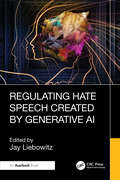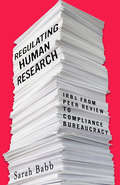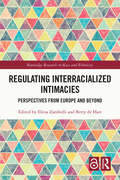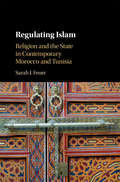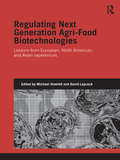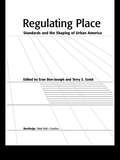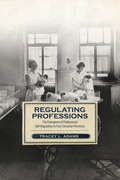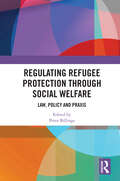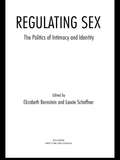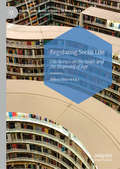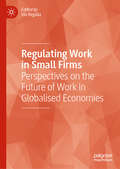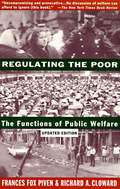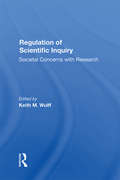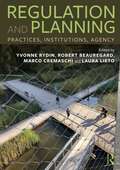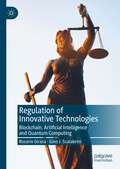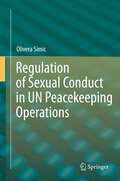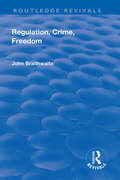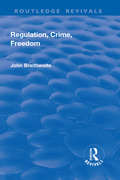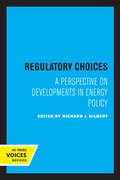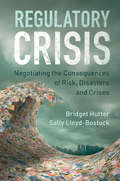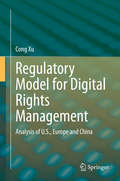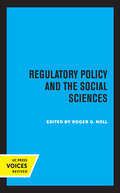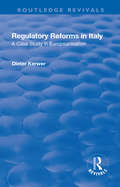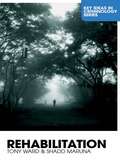- Table View
- List View
Regulating Hate Speech Created by Generative AI
by Jay LiebowitzRegulating Hate Speech Created by Generative AI explores the new hybrid space of Human Machine Interaction (HMI) in which hate speech is represented and computed through algorithms and AI generative systems. The book is exploratory because there are still many problem-solving challenges to be faced. It is also innovative because it is not assuming that solutions lie only in technological advancements but on a broader scale. In this sense, large language models can and are being considered from a holistic view (i.e., from the different dimensions and layers of regulatory and legal governance). Highlights of the book include: Generative AI and social engines of hate An introduction to generative Artificial Intelligence application, trends, and ethics The mechanics and validation of generative AI outcomes An evaluation of Generative AI for hate speech detection Best practices and key considerations for AI regulation Using GenAI capabilities for early detection of threats in the digital environment. This book is a hard look at ways to regulate generative AI to reduce online hate and secure justice in a digital environment. Featuring research and offering practical guidelines, the book examines guidelines for regulating generative AI models, so they do not contribute to online hate disinformation and imagery.
Regulating Human Research: IRBs from Peer Review to Compliance Bureaucracy
by Sarah BabbInstitutional review boards (IRBs) are panels charged with protecting the rights of humans who participate in research studies ranging from biomedicine to social science. Regulating Human Research provides a fresh look at these influential and sometimes controversial boards, tracing their historic transformation from academic committees to compliance bureaucracies: non-governmental offices where specialized staff define and apply federal regulations. In opening the black box of contemporary IRB decision-making, author Sarah Babb argues that compliance bureaucracy is an adaptive response to the dynamics and dysfunctions of American governance. Yet this solution has had unforeseen consequences, including the rise of a profitable ethics review industry.
Regulating Interracialized Intimacies: Perspectives from Europe and Beyond (Routledge Research in Race and Ethnicity)
by Betty De Hart Elena ZambelliThis book explores the role of the law in the social construction of ‘race’ and ‘mixture’ within and beyond the borders of Europe. It focuses on ‘interracialized’ intimacies, that is, the intimate relations of subjects ascribed and/or perceived to belong to different ‘races’. The role of the state in defining boundaries between ‘us’ and ‘them’ becomes particularly clear in their regulation. Moving across different times, places and political formations – including the US slavery regime, European colonial empires and metropolises – the book delves deep into how the governments of white-supremacist and white-majority societies have consistently attempted to prevent, discourage or obstruct intimate relationships crossing the colour line. This occurred directly, through prohibitions and anti-miscegenation laws, or indirectly, through citizenship laws, marriage licenses, social care, prostitution laws, housing policies, policing practices and other means. The book further shows that the legacy of these highly gendered and racialized regulations continues to reverberate today, informing norms, hierarchies and perceptions about whose intimacies count as legitimate and ought to be facilitated and whose are deemed suspect and requiring state surveillance. The contributions also shed light on the individuals, couples and families who were targeted by state regulations and how they challenged and disturbed state categorizations and regulations.Highly interdisciplinary in scope, with contributions by pioneering United States and European scholars in this field, this book will be a fundamental read for scholars, researchers and students interested in tracing the genealogy of racial thinking in Europe and beyond, and its enduring operativity.
Regulating Islam: Religion and the State in Contemporary Morocco and Tunisia
by Sarah J. FeuerMany countries in the Arab world have incorporated Islam into their state- and nation-building projects, naming it the 'religion of the state'. Regulating Islam offers an empirically rich account of how and why two contemporary Arab states, Morocco and Tunisia, have sought to regulate religious institutions and discourse. Drawing on a range of previously unexamined sources, Sarah J. Feuer traces and analyzes the efforts of Moroccan and Tunisian policymakers to regulate Islamic education as part of the respective regimes' broader survival strategies since their independence from French rule in 1956. Out of the comparative case study emerges a compelling theory to account for the complexities of religion-state dynamics across the Arab world today, highlighting the combined effect of ideological, political, and institutional factors on religious regulation in North Africa and the Middle East. The book makes an important and timely contribution to the on-going scholarly and policy debates concerning religion, politics, and authoritarian governance in the post-uprisings Arab landscape.
Regulating Next Generation Agri-Food Biotechnologies: Lessons from European, North American and Asian Experiences (Genetics and Society)
by Michael Howlett David LaycockAgri-food bio-technology policy and regulation is transitioning from an early period focused on genetic engineering technologies to ‘next-generation’ rules and regulatory processes linked to challenges originating in a wide variety of new technological processes and applications. Can lessons learned from past and current regulatory oversights of agricultural biotechnology – and other high-technology sectors – help us address new and emerging regulatory challenges in the agri-food genetics sector? The expert contributors in this volume discuss the experiences of a wide range of North American, European and Asian countries with high technology regulation to address four key questions related to the past and future development of agri-food genomics regulation across the globe. how unique is agri-food biotechology regulation, and how can it be evaluated using the existing tools of regulatory analysis developed in examinations of other sectors? is a ‘government to governance’ model of regulatory regime development found in many other sectors relevant in this rapidly evolving sphere of activity? is a stages model of regulatory regime development accurate? And, if so, at which stage are we currently positioned in the regulation of agri-food genomics products and technologies? what drives movement between stages in different countries and sectors? In assessing such drivers, what are the key links between sectoral (meso) developments and more general macro and micro developments such as international relations and administrative behaviour? By updating, extending and challenging earlier empirical and theoretical social science perspectives on agricultural bio-technological regulation, this volume helps to inform future policy formulation. It will be of interest to practitioners and students of biotechnology, agriculture, and science and technology policy, and regulatory processes more generally.
Regulating Place: Standards and the Shaping of Urban America
by Eran Ben-Joseph Terry S. SzoldTracing how codes arose when they did, and how they were adapted over time, the authors examine the increasing influence of regulatory codes over urban design and planning in the past century.
Regulating Professions: The Emergence of Professional Self-Regulation in Four Canadian Provinces
by Tracey L AdamsSelf-regulation has long been at the core of sociological understandings of what it means to be a "profession." However, the historical processes resulting in the formation of self-regulating professions have not been well understood. In Regulating Professions, Tracey L. Adams explores the emergence of self-regulating professions in British Columbia, Ontario, Quebec, and Nova Scotia from Confederation to 1940. Adams’s in-depth research reveals the backstory of those occupations deemed worthy to regulate, such as medicine, law, dentistry, and land surveying, and how they were regulated. Adams evaluates sociological explanations for professionalization and its regulation by analysing their applicability to the Canadian experience and especially the role played by the state. By considering the role of all those involved in creating the professional landscape in Canada, Adams provides a clear picture of the process and illuminates how important this has been in building Canadian institutions and society.
Regulating Refugee Protection Through Social Welfare: Law, Policy and Praxis
by Peter BillingsThis book analyses the use and abuse of social welfare as a means of border control for asylum seekers and refugees in Australia. Offering an unparalleled critique of the regulation and deterrence of protection seekers via the denial or depletion of social welfare supports, the book includes contributions from legal scholars, social scientists, behavioural scientists, and philosophers, in tandem with the critical insights and knowledge supplied by refugees. It is organised in three parts, each framed by a commentary that serves as an introduction, as well as offering pertinent comparative perspectives from Europe. Part One comprises three chapters: a rights-based analysis of Australia’s ‘hostile environment’ for protection seekers; a searing critique of welfare policing of asylum seekers as ‘necropolitics’; and a unique philosophical perspective that grounds scrutiny of Australia’s policing of asylum seekers. Part Two contains five chapters that uncover and explore the lived experiences and adverse impacts of different social welfare restrictions for refugee protection seekers. Finally, the chapters in Part Three offer distinct views on human rights advocacy movements and methods, and the scope for resistance and change to the status quo. This book will appeal to an international, as well as an Australian, readership with interests in the areas of human rights, immigration and refugee law, social welfare law/policy, social work, and public health.
Regulating Sex: The Politics of Intimacy and Identity (Perspectives on Gender)
by Elizabeth Bernstein Laurie SchaffnerRegulating Sex is an anthology that presents debates over the role of the state in constructing and controlling erotic practice, intimacy, and identity. The purpose of this edited volume is to address sexual dilemmas in law and the state in substantive areas such as same-sex domestic partnerships, sexual economies, and childhood sexuality via a series of spirited dialogues between socio-legal scholars from diverse disciplinary, national, and political perspectives.
Regulating Social Life: Discourses on the Youth and the Dispositif of Age (Postdisciplinary Studies in Discourse)
by Helena OstrowickaThis book presents the original concept of the ‘dispositif of age’, combining post-Foucauldian analytics of the dispositif, discourse and governmentality with the historical semantics of Reinhart Koselleck to explore the functions of the notion of youth in the regulation of social life. Making use of examples from sources including scientific and media statements, youth policy programmes, and strategies at international (European) and local (Polish) levels, the author shows how this concept of youth supports processes of social regulation and contributes to the implementation of political goals as specific responses to issues such as radicalization and violence, unemployment, and economic crisis. This book will be of interest not only to scholars of discourse and youth studies, but also to all post-Foucauldian researchers with an interest in going beyond simple 'applicationism'.
Regulating Work in Small Firms: Perspectives on the Future of Work in Globalised Economies
by Ida RegaliaExploring the diversity of small firms, this contributed volume focuses on the crucial topic of work and the ways in which it is regulated, and offers reflections on the future of labour more generally. Traditionally managed through informal and adaptive processes, small firms allow us to understand the challenges and opportunities facing larger companies within an increasingly fragmented global production system. Analysing the case of Italy, a country characterised by a high number and wide variety of small firms, the authors draw on the results of a survey involving over 2,300 firms and face-to-face interviews with owner-managers working in 60 small and micro firms across several different sectors. Providing detailed analysis which will be useful for scholars of human resource management and small business, as well as managers, practitioners and policy-makers, the book enables a better understanding of the world of work in a globalised economy.
Regulating the Poor: The Functions of Public Welfare
by Frances Fox Piven Richard ClowardOriginally published in 1971, this social science classic outlines the social functions of welfare programs.
Regulation Of Scientific Inquiry: Societal Concerns With Rersearch
by Keith WulffThe increase in regulations affecting the conduct of scientific research, and the debate about their appropriateness and effectiveness, reflect societal concerns with fundamental questions raised by certain types of scientific inquiry. This book addresses issues of ethics, accountability, and conflict as they relate to the rights of inquiry, the rights of citizens, and the role of government in a research-oriented society.
Regulation and Criminal Justice
by Graham Smith Hannah Quirk Toby SeddonWhile regulatory institutions and strategies have been the subject of increasing academic attention, there has been limited application of regulatory theories to criminal justice scholarship. This collection of essays from a range of outstanding international scholars adopts a critical, inter-disciplinary approach, providing an innovative application of regulatory theory to the practice of criminal justice and offering suggestions for further research. Part I explores the aims and values of criminal justice and other regulatory networks and the synergies and tensions between these fields; Part II examines criminal justice as a regulatory force to control 'deviant' and anti-social behaviour and Part III examines the regulation and oversight of criminal justice through the operation of prison inspectorates and explores notions of responsive justice.
Regulation and Planning: Practices, Institutions, Agency
by Yvonne Rydin Laura Lieto Robert Beauregard Marco CremaschiIn Regulation and Planning, planning scholars from the United Kingdom, France, Italy, Sweden, Canada, Australia, and the United States explore how planning regulations are negotiated amid layers of normative considerations. It treats regulation not simply as a set of legal guidelines to be compared against proposed actions, but as a social practice in which issues of governmental legitimacy, cultural understandings, materiality, and power are contested. Each chapter addresses an actual instance of planning regulation including, among others, a dispute about a proposed Apple store in a public park in Stockholm, the procedures by which building codes are managed by planners in Napoli, the role that design plays in regulating the use of public space in a new Paris neighbourhood, and the influence of plans on the regulation of development in Malmö and Cambridge. Collectively, the volume probes the institutions and practices that give meaning and consequence to planning regulations. For planning students learning about what it means to plan, planning researchers striving to understand the influence of planners on urban development, and planning practitioners interested in reflecting on practices that occupy a great deal of their time, this is an indispensable book.
Regulation of Innovative Technologies: Blockchain, Artificial Intelligence and Quantum Computing
by Rosario Girasa Gino J. ScalabriniThis book explores the regulation of emerging technologies. Developments such as bitcoin (based on blockchain technology), artificial intelligence, quantum computing, and other technical advances have the potential to revolutionize many aspects of everyday life. As with other significant occurrences, especially when coupled by financial rewards, there are the inevitable attempts to reap gains unlawfully. This book examines the legal and regulatory enactments that attempt to undermine the risks to society as well as the dangers to individual freedoms that the technologies present when abused by governmental and non-governmental authorities. Included are discussions of the dangers to the right of privacy posed by facial recognition, physical location tracking, automated license plate recognition (ALPR) and other evolving applications of technology. This book is an invaluable resource for those interested in the regulation of emerging technologies particularly as they relate to blockchain, artificial intelligence, and the most current advances in quantum computing. Emphasis is focused on invasion of privacy, particularly by government authorities, antitrust implications of private companies and the efforts of international entities to counter alleged abuses by them.
Regulation of Sexual Conduct in UN Peacekeeping Operations
by Olivera SimicThis book critically examines the response of the United Nations (UN) to the problem of sexual exploitation in UN Peace Support Operations. It assesses the Secretary-General's Bulletin on Special Protection from Sexual Exploitation and Sexual Abuse (2003) (SGB) and its definition of sexual exploitation, which includes sexual relationships and prostitution. With reference to people affected by the policy (using the example of Bosnian women and UN peacekeepers), and taking account of both radical and 'sex positive' feminist perspectives, the book finds that the inclusion of consensual sexual relationships and prostitution in the definition of sexual exploitation is not tenable. The book argues that the SGB is overprotective, relies on negative gender and imperial stereotypes, and is out of step with international human rights norms and gender equality. It concludes that the SGB must be revised in consultation with those affected by it, namely local women and peacekeepers, and must fully respect their human rights and freedoms, particularly the right to privacy and sexuality rights.
Regulation, Crime and Freedom
by John BraithwaiteThis title was first published in 2000: John Braithwaite is a distinguished criminologist with an international reputation in the study of regulation and globalization. This collection contains his most important and influential essays in criminal justice and business regulation. It has a substantial introduction explaining the thematization of his work around the design of regulatory systems to maximize freedoms as non-domination.
Regulation, Crime and Freedom
by John BraithwaiteThis title was first published in 2000: John Braithwaite is a distinguished criminologist with an international reputation in the study of regulation and globalization. This collection contains his most important and influential essays in criminal justice and business regulation. It has a substantial introduction explaining the thematization of his work around the design of regulatory systems to maximize freedoms as non-domination.
Regulatory Choices: A Perspective on Developments in Energy Policy
by Richard J. GilbertRegulatory Choices offers the first comprehensive economic history of energy policy and its consequences for California, where some of the most innovative and far-ranging programs of regulatory reform have originated. The authors of this volume have gathered together an impressive wealth of material about actual policy decisions and their repercussions and have subjected their findings to astute economic analysis. This book will serve for years to come as an invaluable reference on the costs and effects of various energy policies. With its focus on bringing prices in alignment with the true cost of producing power and delivering it to the customer, the first part of the book outlines the issue of setting utility rates and considers some of the proposals to provide regulated industries with incentives to respond to economic and environmental concerns. The problems of energy supply occupy the second part of the book, which includes a survey of the costs of alternative energy sources and estimates of their environmental impacts, as well as a case study of the construction of the Diablo Canyon nuclear power plant. The book concludes by documenting the results of subsidy programs that were designed to target the development of wind power and residential energy conservation. Regulators, we learn, have a mixed record when it comes to managing the production of energy. Some conservation programs have enjoyed considerable economic success, particularly those that correct a lack of consumer information. Others, such as the renewable energy tax credits or programs designed to subsidize new technologies, have cost much more than the value of the energy they have saved. What emerges clearly from this study is that regulated industries are not immune from the forces of competition. This title is part of UC Press's Voices Revived program, which commemorates University of California Press’s mission to seek out and cultivate the brightest minds and give them voice, reach, and impact. Drawing on a backlist dating to 1893, Voices Revived makes high-quality, peer-reviewed scholarship accessible once again using print-on-demand technology. This title was originally published in 1991.
Regulatory Crisis: Negotiating the Consequences of Risk, Disasters and Crises
by Sally Hutter Bridget M. Lloyd-BostockUsing a new concept - 'regulatory crisis' - this book examines how major crises may or may not affect regulation. The authors provide a detailed analysis of selected well-known disasters, tracing multiple interwoven sources of influence and competing narratives shaping crises and their impact. Their findings challenge currently influential ideas about 'regulatory failure', 'risk society' and the process of learning from disasters. They argue that interpretations of and responses to disasters and crises are fluid, socially constructed, and open to multiple influences. Official sense-making can be too readily taken at face value. Failure to manage risks may not be central or even necessary for a regulatory crisis to emerge from a disaster; and the impacts for the regulator can take on a life detached from the precipitating disaster or crisis.
Regulatory Model for Digital Rights Management: Analysis of U.S., Europe and China
by Cong XuThis book highlights the shortcomings of the present Digital Rights Management (DRM) regulations in China. Using literature reviews and comparative analysis from theoretical and empirical perspectives, it appraises different DRM restriction regulations and practices as well as current advice on balance of interests to analyze the dilemma faced by the DRM system.This research intends to help China establish a comprehensive DRM regulatory model through comparative theoretical and empirical critiques of systems in America and Europe. A newly designed DRM regulatory model should be suitable for specific Chinese features, and should consist of government regulated, self-regulated, and even unregulated sections. The new regulation model might be an addition to existing legal structures, while self-regulations/social enforcement also would be as important as legislation based on case studies.
Regulatory Policy and the Social Sciences (California Series on Social Choice and Political Economy #5)
by Roger G. NollThis title is part of UC Press's Voices Revived program, which commemorates University of California Press’s mission to seek out and cultivate the brightest minds and give them voice, reach, and impact. Drawing on a backlist dating to 1893, Voices Revived makes high-quality, peer-reviewed scholarship accessible once again using print-on-demand technology. This title was originally published in 1985.
Regulatory Reforms in Italy: A Case Study in Europeanisation
by Dieter KerwerThis title was first published in 2001. The question this thesis attempts to answer is summarized as follows: what accounts for the amazing stability of Italian transport policy in the face of European challenges, given the fact that - as most national and European policy-makers readily believe - it is not capable of addressing the problem of the sector? This study analyzes the transport policy in Italy from the 1990s into the 21st century. It looks at how the two sub-sectors of surface transport, road haulage and raliways, have been managed by the public and private actors involved. In both sectors the policy appears to have failed, either by not offering a remedy to problems or by aggravating them further. The author believes that studying transport policy in Italy will shed light on the wider question of how national policy-making patterns are influenced by developments in the international environment; in this case looking closely at the influence of the European Union.
Rehabilitation
by Tony Ward Shadd MarunaOver the last two decades, empirical evidence has increasingly supported the view that it is possible to reduce re-offending rates by rehabilitating offenders rather than simply punishing them. In fact, the pendulum’s swing back from a pure punishment model to a rehabilitation model is arguably one of the most significant events in modern correctional policy. This comprehensive review argues that rehabilitation should focus both on promoting human goods (i.e. providing the offender with the essential ingredients for a 'good' life), as well as reducing/avoiding risk. Offering a succinct summary and critique of the scientific approach to offender rehabilitation, this intriguing volume for students of criminology, sociology and clinical psychology gives a comprehensive evaluation of both the Risk-Need Model and the Good Lives Model. Rehabilitation is a value-laden process involving a delicate balance of the needs and desires of clinicians, clients, the State and the public. Written by two international leading academics in rehabilitation research, this book argues that intervention with offenders is not simply a matter of implementing the best therapeutic technology and leaving political and social debate to politicians and policy makers.
